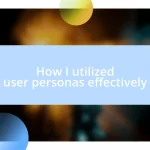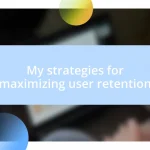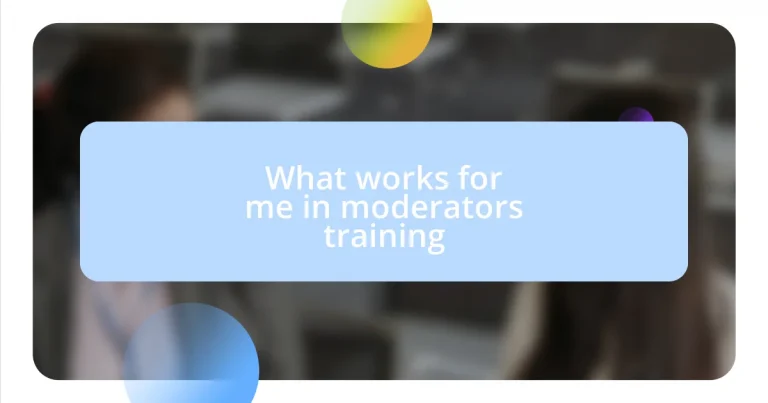Key takeaways:
- Effective moderators create safe spaces for diverse viewpoints through active listening and inclusivity, transforming tense moments into constructive dialogue.
- Key skills for successful moderation include adaptability, empathy, and the use of open-ended questions to enhance participant engagement and discussion quality.
- Ongoing feedback mechanisms and participation in resources like online courses and peer networks contribute to continuous improvement in moderation practices.
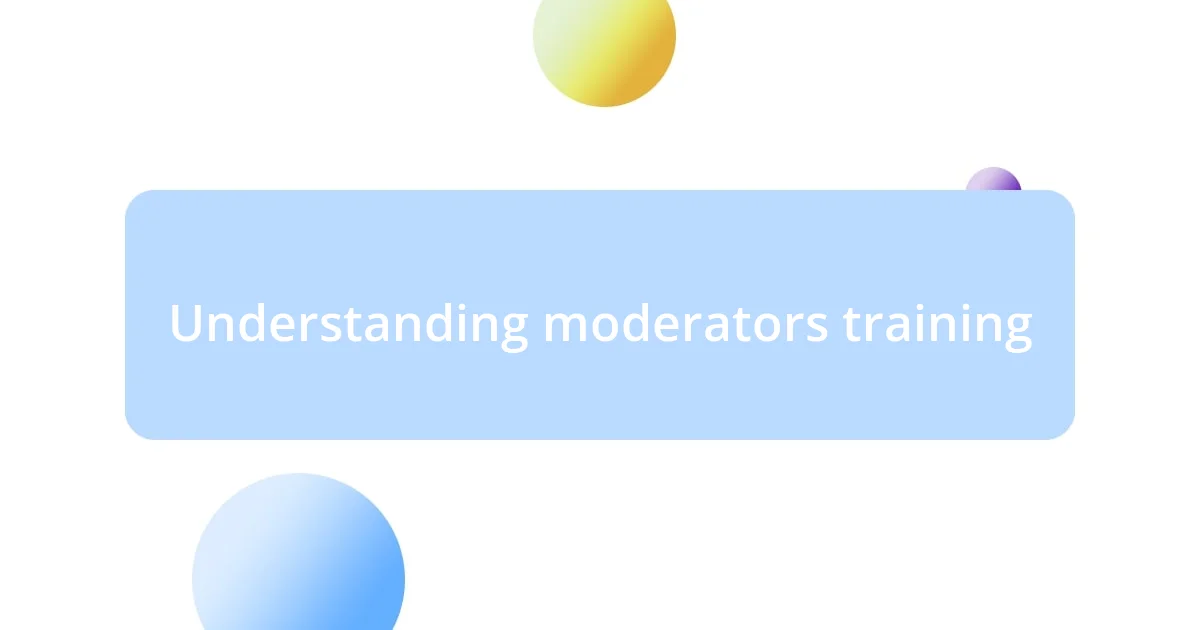
Understanding moderators training
Moderators training is essential for equipping individuals with the skills necessary for guiding discussions effectively. I remember my first training session; it felt overwhelming at first, but as I delved into techniques for creating a safe space for dialogue, I realized just how impactful a skilled moderator can be. Have you ever been in a conversation that felt stuck or tense? Trained moderators know how to navigate those tricky moments.
One key aspect of moderators training is learning how to deal with diverse viewpoints. I often reflect on a workshop where we practiced role-playing with contrarian perspectives. It was fascinating to see how a skilled mod could shift tensions into constructive conversations. This experience always makes me think: how can we better embrace differing opinions in our daily lives?
Moreover, active listening is a cornerstone skill emphasized in any training. I once led a session where participants practiced summarizing what others had said—this simple act transformed the dynamics in the room. It not only makes participants feel valued but also fosters deeper engagement. Isn’t it amazing how much can change with just a little practice in active listening?
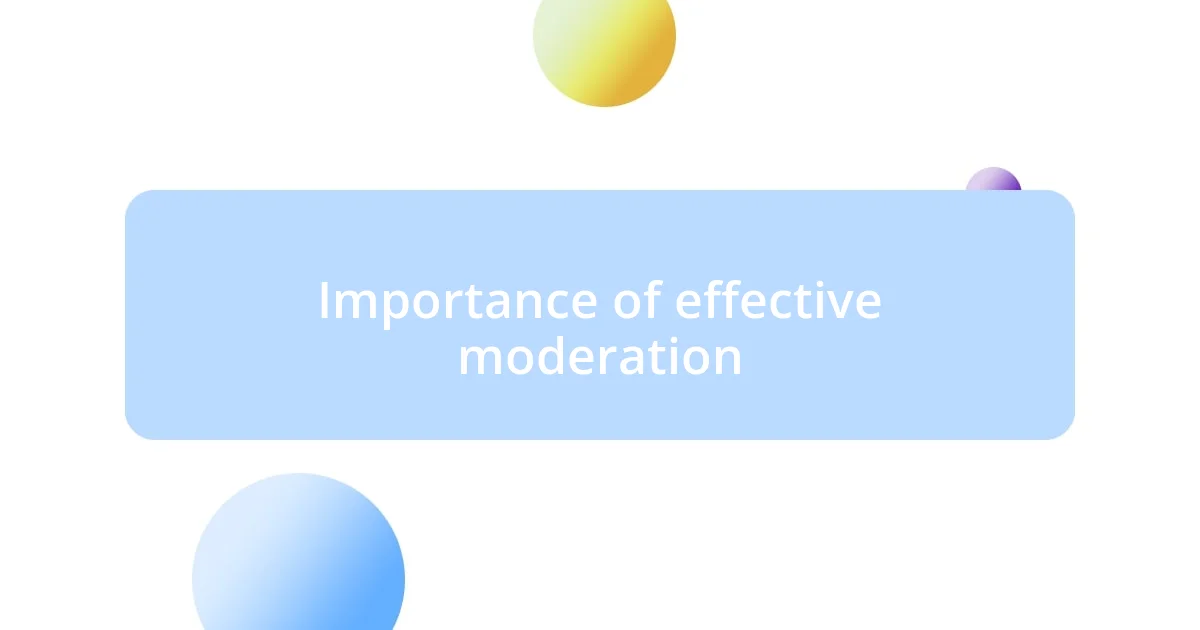
Importance of effective moderation
Effective moderation plays a crucial role in fostering an environment where participants feel safe and encouraged to share their thoughts. I recall a session where the moderator actively worked to include quieter voices in the discussion. Witnessing this shifted the energy in the room entirely; those who usually held back suddenly felt empowered to express their ideas. It made me realize just how vital it is for a moderator to proactively create space for all voices.
When discussions become heated, the moderator acts as the glue that holds the group together. I remember a particularly intense debate during one of my training sessions. The moderator skillfully intervened by acknowledging the emotions on both sides. This helped diffuse the tension, transforming potential conflict into a collaborative dialogue. It’s incredible how effective moderation can turn a volatile moment into a productive exchange of ideas.
Furthermore, understanding group dynamics is an essential part of effective moderation. I once found myself in a training where we analyzed how different personality types influence conversations. It struck me how a moderator’s ability to read the room can drastically impact the effectiveness of discussions. Have you ever noticed how some people naturally steer conversations? Being attuned to these dynamics enables a moderator to engage participants in a way that resonates deeply and fosters meaningful connections.
| Aspect of Moderation | Impact |
|---|---|
| Active Listening | Builds trust and encourages participation |
| Conflict Resolution | Transforms tension into constructive dialogue |
| Inclusivity | Ensures all voices are heard and valued |
| Understanding Dynamics | Enhances engagement by adapting to group needs |
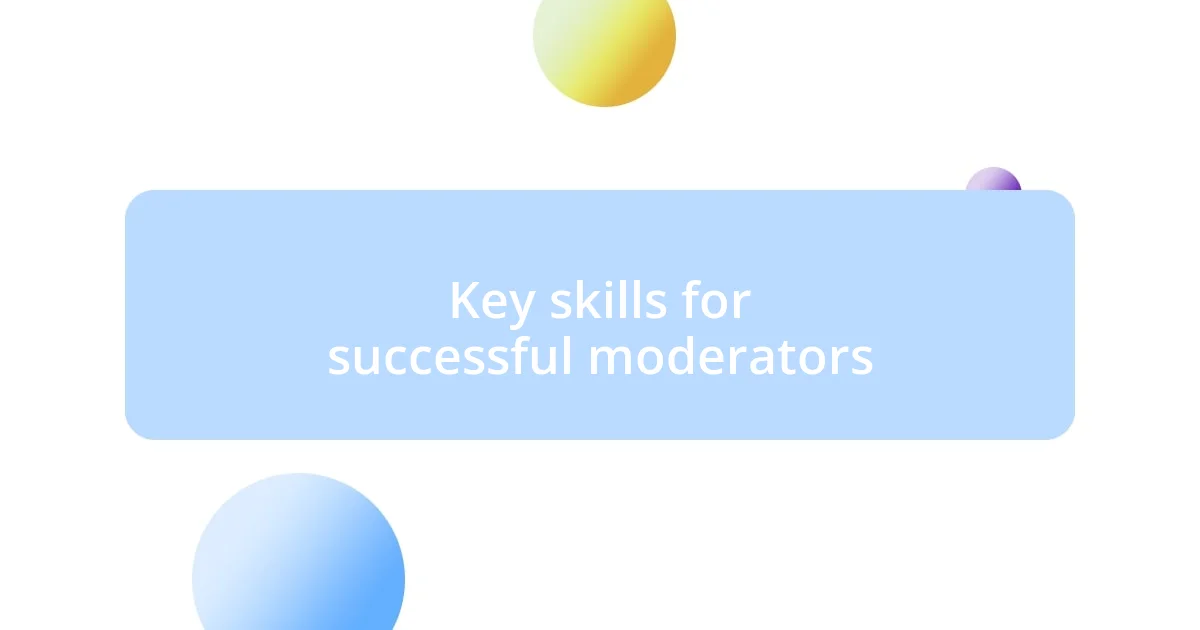
Key skills for successful moderators
As I reflect on my journey in moderators training, I realize that several key skills stand out as essential for success. One of these is the ability to create a sense of belonging among participants. I vividly remember facilitating a session where some people hesitated to speak up. I tried a simple icebreaker, and suddenly, participants started sharing their stories like flowers blooming in spring. It showed me how establishing that initial comfort can lead to richer, more engaged discussions.
Another crucial skill is adaptability. There was a time during a workshop where an unexpected topic disruption occurred. I had to think on my feet, encouraging the group to explore this new direction without losing focus. That experience taught me the importance of being flexible and responsive to the group’s needs, which ultimately enhances the quality of the conversation.
- Active Listening: Demonstrates genuine interest and fosters trust.
- Empathy: Helps in understanding participant emotions and perspectives.
- Adaptability: Enables moderators to navigate unexpected twists in discussions.
- Facilitation Techniques: Employs various methods to engage participants and clarify points.
- Conflict Management: Transforms potential disputes into collaborative dialogue.
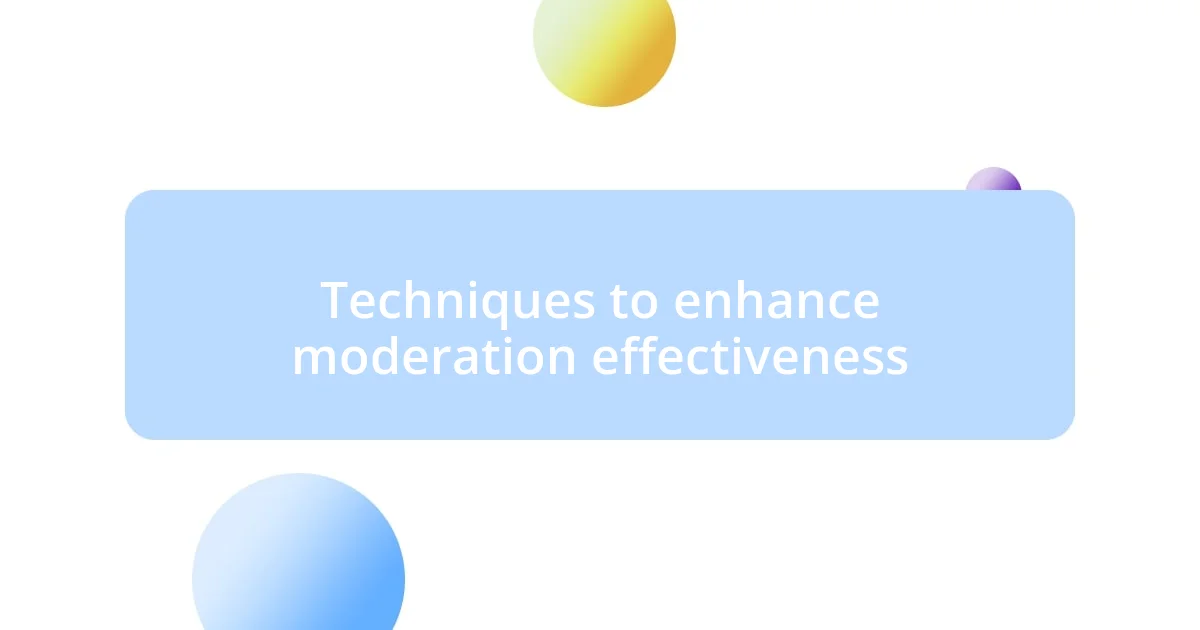
Techniques to enhance moderation effectiveness
One technique that has consistently enhanced my effectiveness as a moderator is utilizing open-ended questions. I remember a session where we were stuck in a loop of simple yes/no answers. By asking, “What did you find most surprising about that topic?” the conversation blossomed into a rich discussion. Open-ended questions not only prompt deeper thinking but also invite participants to share their unique perspectives, making everyone feel valued. Isn’t it fascinating how a simple shift in questioning can elevate the dialogue?
Another powerful method is checking in with participants during discussions, especially after a heated exchange. I recall an experience where emotions ran high, and I paused to ask, “How is everyone feeling about what’s just been discussed?” This simple inquiry allowed space for reflection and provided a moment for recalibration, fostering a sense of safety. Engaging with the emotional temperature of the room is essential. Have you ever experienced the relief that comes from being acknowledged in a tense moment?
Finally, I find that summarizing key points during a discussion acts as a valuable anchor for participants. There was a workshop where I noticed some confusion about the various ideas being shared. By taking the time to synthesize our discussions, I helped clarify our collective understanding and reignited the group’s focus. It’s amazing how much clearer the path becomes when we take a moment to consolidate our thoughts. Don’t you agree that clarity is sometimes the best ally in fruitful dialogue?
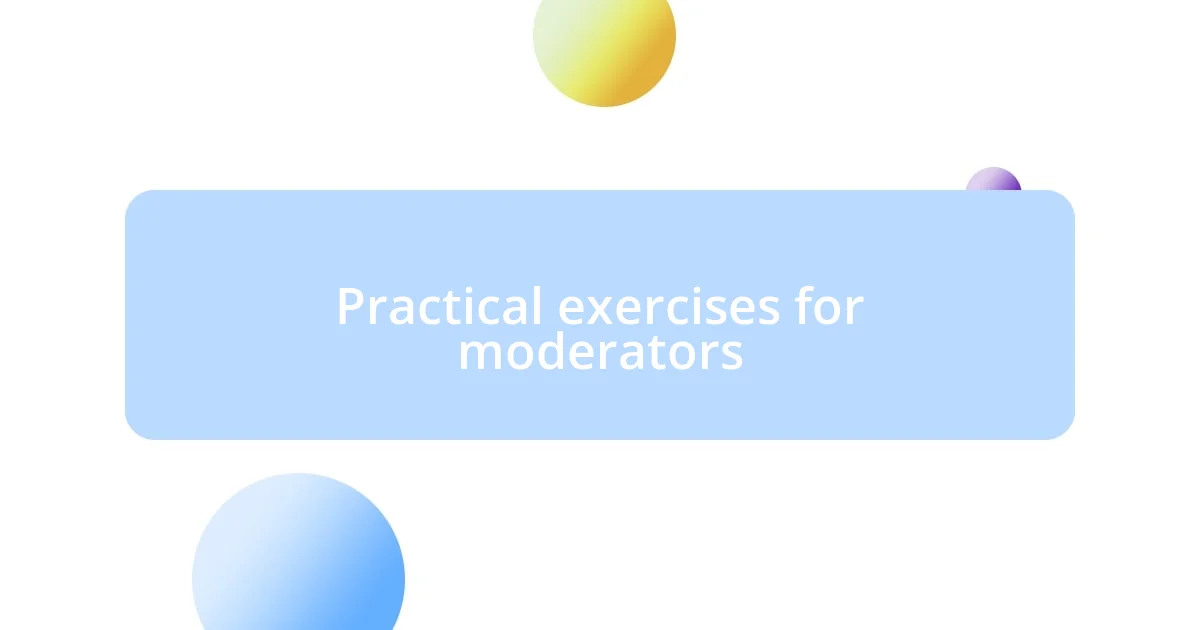
Practical exercises for moderators
One practical exercise I’ve found effective for moderators is role-playing difficult scenarios. In one training session, we simulated a situation where a participant continually interrupted others. I played the role of the moderator and had to manage my responses while maintaining the flow of conversation. This hands-on approach not only prepares you for real-life challenges but also sharpens your conflict management skills. Have you ever felt the pressure of addressing disruption in a group? It’s a skill you can absolutely develop through practice!
Another engaging exercise is the “pause and reflect” technique. During one of my workshops, I introduced brief pauses after significant points were made. Participants would take a moment to jot down their thoughts before the conversation continued. This practice not only deepened their engagement but also provided space for those who might be hesitant to share. Isn’t it interesting how a simple pause can lead to richer contributions?
Lastly, I enjoy implementing small group discussions within larger sessions. In my experience, splitting participants into pairs or triads often encourages quieter individuals to express their ideas. I recall after introducing this format, a shy participant who rarely spoke in group settings shared insightful perspectives when paired with a more outgoing person. It made me realize the incredible power of creating comfortable environments. Have you noticed how different dynamics emerge in smaller groups? It’s where some of the most genuine conversations often blossom.
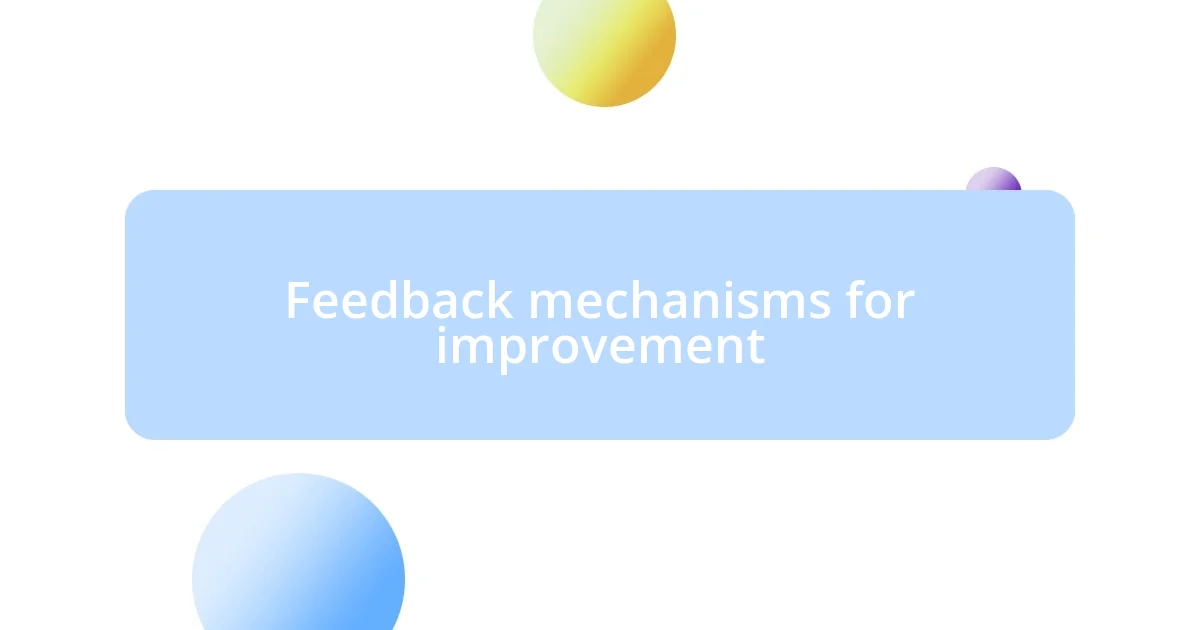
Feedback mechanisms for improvement
Incorporating feedback mechanisms into moderator training has dramatically shifted my approach over time. Early in my journey, I often hesitated to seek input from participants. However, after implementing anonymous surveys post-session, I discovered powerful insights—like the importance of pacing in discussions. The feeling of knowing that my efforts were resonating with the group was rewarding. Have you ever considered how much you might learn just by asking for feedback?
I also find that ongoing, informal check-ins can pave the way for improvement. After a session, I make a point to connect with a few participants to ask for their thoughts on what worked and what didn’t. I remember a time when one participant mentioned they felt overwhelmed by the information shared. This honest feedback prompted me to adjust the content delivery in future sessions. Doesn’t it feel liberating to realize that participants want to help shape their experience?
Lastly, I often encourage peer feedback among moderators themselves. In one training cohort, we set up a buddy system where we observed each other’s sessions and exchanged constructive criticism afterward. This not only strengthened our skills but also fostered camaraderie within the group. Have you noticed how valuable it is to learn alongside peers who share the same challenges? It creates an atmosphere of collective growth that elevates the entire learning experience.
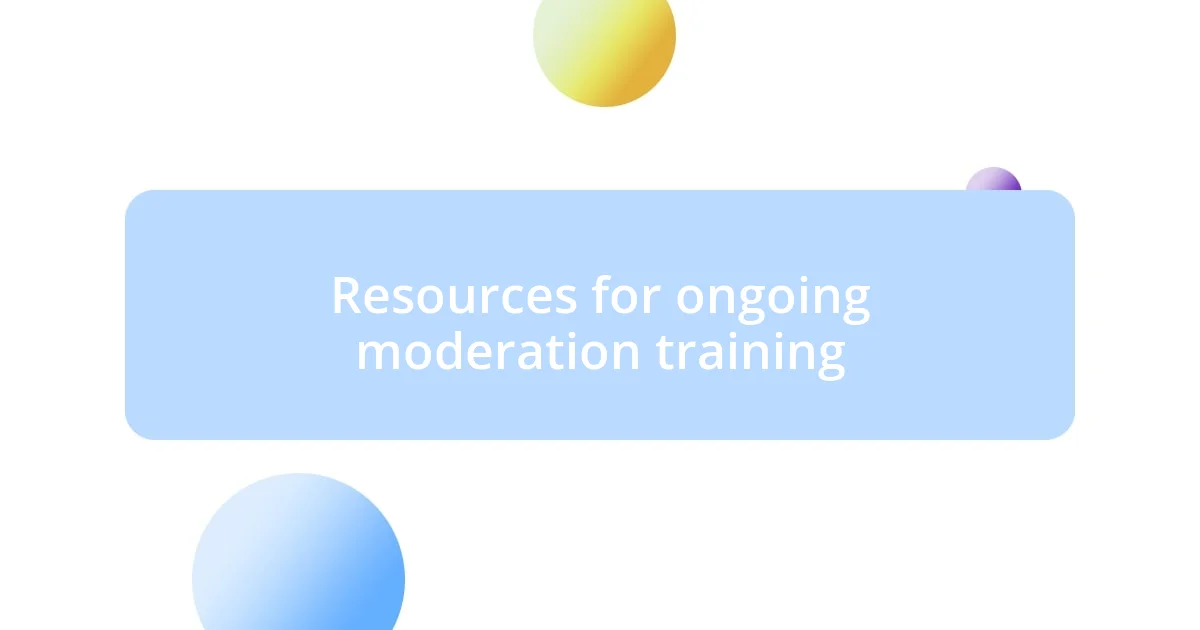
Resources for ongoing moderation training
When it comes to resources for ongoing moderation training, I truly value online courses and webinars. They have opened doors for me to learn from experts globally. For instance, after attending a live webinar on managing virtual discussions, I picked up several strategies that I immediately applied in my own sessions. The interactive nature of these platforms allowed me to ask questions in real-time, which deepened my understanding. Have you ever felt the spark of inspiration from a simple online session?
Books and articles also provide a wealth of knowledge. I distinctly remember reading “Crucial Conversations,” which offered insights into navigating tough dialogues. The concepts I learned not only enriched my moderation skills but also highlighted the importance of emotional intelligence in guiding conversations. I often reflect on how a book can serve as a mentor, providing guidance when I feel uncertain. What’s a book that’s significantly impacted your approach to moderation?
Finally, I find immense value in community forums and support groups. Connecting with fellow moderators—sharing tips, challenges, and success stories creates a powerful network of resources. One particularly memorable exchange involved a discussion about managing conflicts in online settings. Someone shared a strategy that turned out to be a game changer for me. It’s fascinating how collaboration can lead to innovative solutions. Have you explored the potential of a peer network in your own development?






